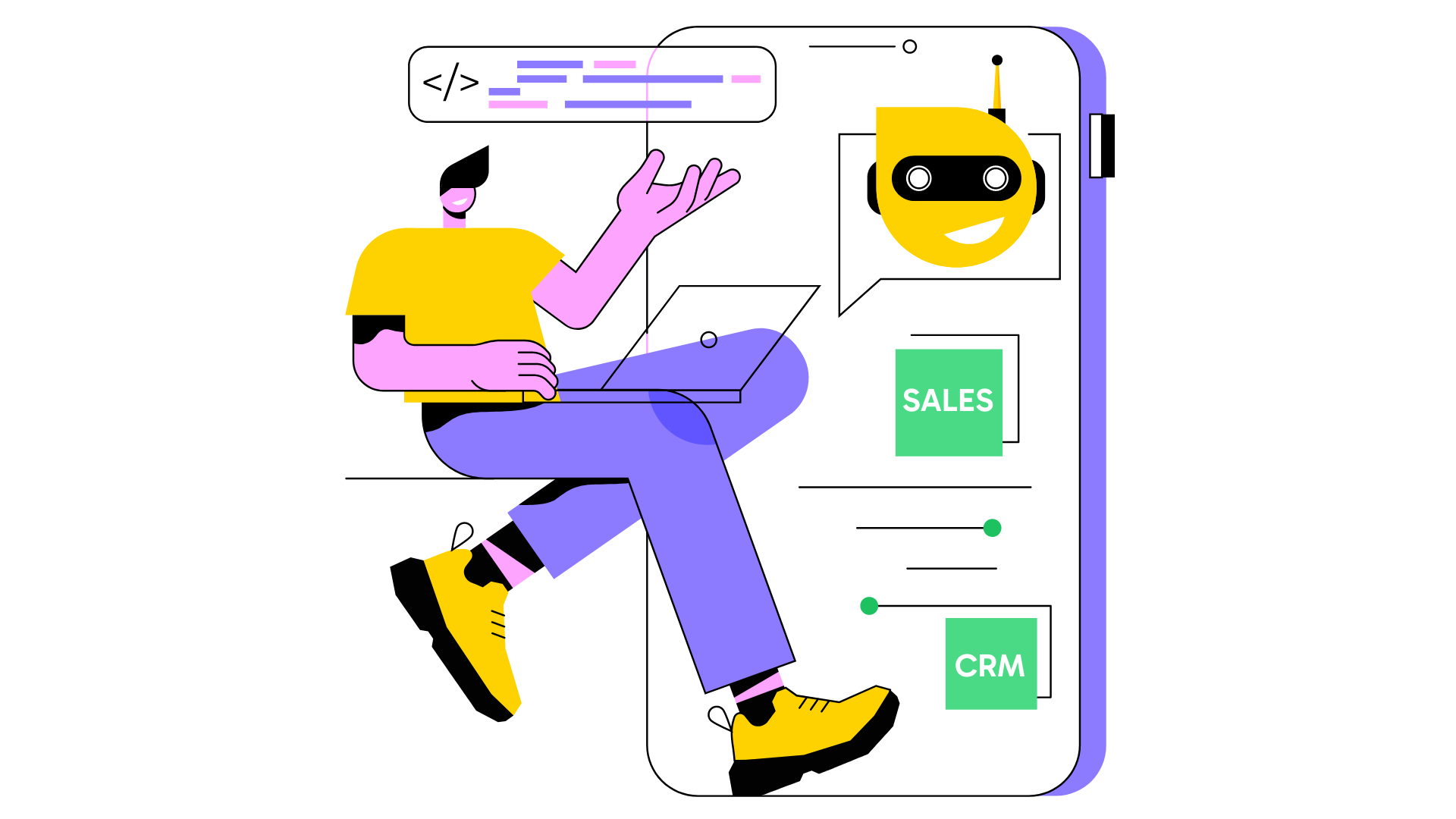Guide to AI Sales Enablement: Top Use Cases & Tools
Explore how AI sales enablement tools automates tasks, personalizes outreach, and helps sales teams close more deals by improving efficiency and decision-making.

Sales teams today are under constant pressure to increase efficiency and close more deals. With the rise of artificial intelligence (AI), sales enablement has entered a new era, offering tools that can automate tasks, provide actionable insights, and personalize interactions at scale. In fact, according to a report by Salesforce, 83% of high-performing sales teams are using AI to drive revenue growth. By integrating AI into your sales strategies, you can not only save valuable time but also make smarter decisions that drive success.
How can AI in sales enablement specifically help you close more deals and boost your sales performance? Let's explore.
What is AI sales enablement?
AI in sales enablement is how you use artificial intelligence to make your sales process more efficient and effective. It helps you automate tasks, analyze data, and personalize customer interactions. AI can assist you in generating leads, recommending the right content, forecasting sales, training your team, and managing customer relationships, allowing you to close more deals and work smarter.
For example, 33% of sales organizations use AI tools, with 80% of sales leaders reporting improved time management for their teams. This enables sales teams to focus on high-priority tasks, reduce manual efforts, and increase overall productivity.
After understanding what AI in sales enablement is and how it helps streamline the sales process, let's dive deeper into how it specifically helps salespeople close more deals.
How Does AI in Sales Enablement Help Salespeople Close More Deals: Key Use Cases
AI in sales enablement can help you close more deals by making your sales process faster, smarter, and more personalized. Here’s how:
1. Focus on the Right Leads
AI analyzes customer data to identify leads with the highest potential, allowing you to prioritize efforts effectively. By scoring and ranking leads based on behavior and engagement, AI helps you focus on prospects most likely to convert, optimizing your sales funnel.
2. Personalize Your Approach
AI can analyze customer data to understand what they need and prefer, allowing you to send more targeted and relevant messages. The more personalized your outreach, the more likely you are to engage your prospects and build trust.
3. Automate Time-Consuming Tasks
AI automates repetitive tasks such as scheduling meetings, sending follow-up emails, and updating CRM records. This automation frees up valuable time for sales representatives, allowing them to focus on high-impact activities like engaging with customers and closing deals.
4. Know Which Deals Are Most Likely to Close
AI predicts the likelihood of deals closing by analyzing data from similar past transactions. This insight enables sales teams to focus efforts on opportunities with the highest probability of success, improving overall conversion rates.
5. Get Coaching and Feedback
AI-powered tools can record and transcribe sales calls, providing analysis and feedback on performance. This allows sales representatives to identify areas for improvement, refine their pitches, and enhance objection-handling techniques, leading to continuous skill development.
6. Send the Right Content at the Right Time
AI can suggest the best content to share with your prospects, like case studies, product demos, or testimonials. It ensures you’re always prepared with the right resources to move the conversation forward.
7. Real-Time Insights
AI tracks how prospects are reacting to your emails, calls, or meetings, giving you real-time updates on their level of interest. If something isn’t working, you can quickly adjust your approach and keep the momentum going.
8. Accurate Sales Forecasting
By analyzing historical data and current sales activities, AI delivers precise sales forecasts. These forecasts offer a clear view of your sales pipeline, aiding in strategic decision-making regarding resource allocation and focus areas.
By using AI to automate tasks, improve your approach, and give you better insights into your prospects, you can spend less time on manual work and more time closing deals.
Now that we've seen how AI can impact the sales process, let's take a look at some of the leading AI tools available for sales enablement. These tools can help you automate tasks, optimize outreach, and ultimately drive better results.
Top 5 Sales Enablement AI tools
1. Alisha by Floworks
Alisha is an AI-powered Sales Development Representative (SDR) designed to automate lead generation, outreach, follow-ups, and meeting scheduling. By using advanced AI and natural language processing (NLP), it helps sales teams streamline their processes, increase engagement, and boost productivity.
Key Features:
- AI-Powered Lead Generation: Automatically identifies and engages with leads based on your Ideal Customer Profile (ICP).
- Personalized Outreach: Crafts personalized emails and messages at scale, increasing engagement.
- Automated Follow-Ups: Sends timely and intelligent follow-up emails based on lead interactions.
- Meeting Scheduling: Integrates with calendars to automate meeting scheduling, reducing manual work.
- Real-Time Insights: Provides performance analytics to help sales teams optimize outreach and engagement strategies.
- Secure Data Handling: Employs strong security protocols to protect client data.
2. Drift
Drift is a conversational sales platform that uses AI-powered chatbots to automate lead qualification and enhance engagement with website visitors. It helps sales teams convert more leads by delivering personalized, real-time experiences.
Key Features:
- AI-Powered Chatbots: Automates lead qualification and schedules meetings with sales reps.
- Real-Time Visitor Engagement: Engages website visitors instantly based on their behavior.
- Personalized Messaging: Sends tailored messages based on visitor data and activity.
- Customizable Chatbot Workflows: Creates personalized chatbot workflows that guide prospects through the sales process.
3. Gong
Gong is a conversation analytics and sales intelligence platform that helps teams improve their sales strategies by analyzing sales calls and meetings. Using AI, it identifies trends, behaviors, and insights that can be used to optimize sales approaches.
Key Features:
- Automatic Call Transcription: Provides full transcriptions of sales conversations for review and training.
- Sentiment & Emotion Analysis: Tracks customer sentiment during calls to better understand engagement.
- Deal Tracking: Analyzes deal progression and identifies red flags in the sales process.
- Conversation Trends: Identifies patterns in successful calls and recommends best practices.
4. Salesforce
Salesforce is an AI layer built into the Salesforce CRM, designed to boost sales productivity by providing smart recommendations, automated insights, and predictive analytics. It helps sales teams focus on the best opportunities and optimize their workflows.
Key Features:
- Predictive Lead Scoring: Automatically ranks leads based on their likelihood to convert.
- Opportunity Insights: Offers detailed insights into each deal, helping reps prioritize their efforts.
- AI-Driven Analytics & Forecasting: Uses historical data to provide forecasts and performance predictions.
- Automated Workflows: Streamlines processes, reducing manual effort and time spent on repetitive tasks.
5. Outreach
Outreach is a comprehensive sales engagement platform that utilizes AI to streamline outreach efforts, boost rep productivity, and personalize communication with prospects. It's perfect for sales teams looking to enhance their email campaigns and sales sequences.
Key Features:
- Automated Sales Sequences: Sets up personalized email sequences that run automatically.
- Predictive Analytics: Helps prioritize leads based on their likelihood to convert.
- Personalized Email Templates: Customizes emails to match the prospect’s profile.
- Interaction Tracking: Tracks and reports on email interactions and sales touchpoints.
Conclusion
AI is transforming the way sales teams work, helping them become more efficient and effective. By integrating AI into your sales strategy, you can automate repetitive tasks, gain valuable insights, and tailor your approach to each customer. Whether it's automating lead generation, personalizing outreach, or predicting which deals are most likely to close, AI makes it easier to focus on what matters most—building relationships and closing deals.
If you're ready to boost your sales performance, Alisha by Floworks can help. With its AI-powered features, Alisha streamlines lead generation, automates follow-ups, and provides real-time insights to keep your team on track.
Start using Alisha today and see the impact AI can have on your sales team!
FAQs
1. How can AI be used in sales?AI in sales can automate repetitive tasks, like lead generation and follow-ups, analyze data to predict customer behavior, and personalize outreach at scale. It helps sales teams prioritize leads, forecast sales, and provide real-time insights into customer interactions. With AI, sales reps can focus more on building relationships and closing deals.
2. What is AI Enablement?AI Enablement refers to integrating artificial intelligence tools into existing sales processes to enhance performance and productivity. It empowers sales teams to work smarter by automating tasks, optimizing strategies, and providing actionable insights. The goal is to enable salespeople to focus on high-value activities while AI handles repetitive or time-consuming tasks.
3. Will AI replace salesmen?AI is unlikely to replace salespeople entirely, but it will transform the way they work. Instead of replacing humans, AI will augment their abilities by handling routine tasks and providing valuable insights, allowing sales teams to focus on building relationships and closing complex deals. Salespeople will still be essential for human connection and high-touch engagements.
4. What is the difference between AI and AI-enabled?AI refers to systems or software that can perform tasks typically requiring human intelligence, such as learning, problem-solving, and decision-making. AI-enabled, on the other hand, refers to tools or processes that incorporate AI technology to enhance or automate specific functions within a broader system or platform. Essentially, AI is the underlying technology, while AI-enabled describes how that technology is applied within a larger context.


